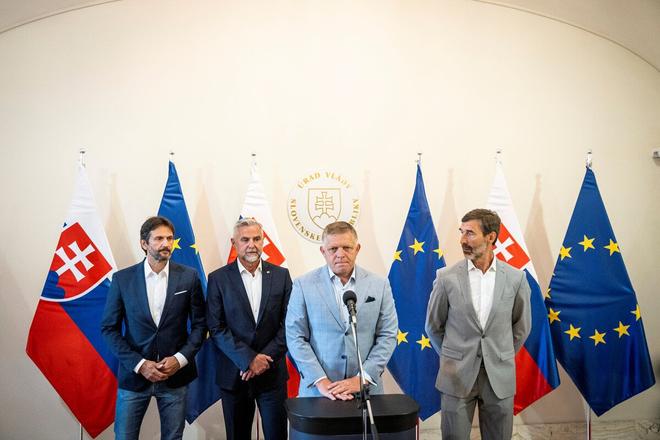Welcome to your weekly commentary and overview of news from Slovakia. Fico praises what he calls the “standardisation of relations” with Russia. His post-Alaska summit comments are in line with his affinity for authoritarian strongmen – something he displayed once again last week, at the expense of Slovaks in Serbia. The ambulance tender is cancelled under murky circumstances.
If you have a suggestion on how to make this overview better, let me know at michaela.terenzani@spectator.sk.
Where Robert Fico sees himself
The people of Slovakia could breathe a sigh of collective relief on Saturday morning. Their prime minister – back home from Croatia, where he had been holidaying for most of the summer until last week – let them all know via his favourite communication channel – Facebook – that the Alaska summit, in form and process, “fully falls within the sovereign Slovak foreign policy oriented on all four corners of the world”. Phew!
Never mind that there is no ceasefire and that Russia is continuing its near-daily air attacks on civilian targets across Ukraine. Never mind the worries of observers that the warm reception extended to Putin in Alaska and the lack of any consequences for his violating Donald Trump’s ultimatum(s) may further embolden the Russian president – which should first and foremost worry countries on the eastern frontier of NATO, including the one governed by Robert Fico. No, the Slovak prime minister left no room for doubt about which side his government and its “sovereign” foreign policy stands on.
He did not mention the territorial integrity of Slovakia’s neighbour, but applauded the “standardisation of relations” between the US and Russia, stressing that this is what he has been calling for on the European level as well. He did not mention the terror faced by the Ukrainian population for three and a half years now, but he empathised with Putin, repeating his words about “the historical roots of the war”, without specifying that when Putin talks about historical roots, he also means Slovakia’s NATO membership. He stressed that security guarantees must be provided not just to Ukraine – but also to Russia.


